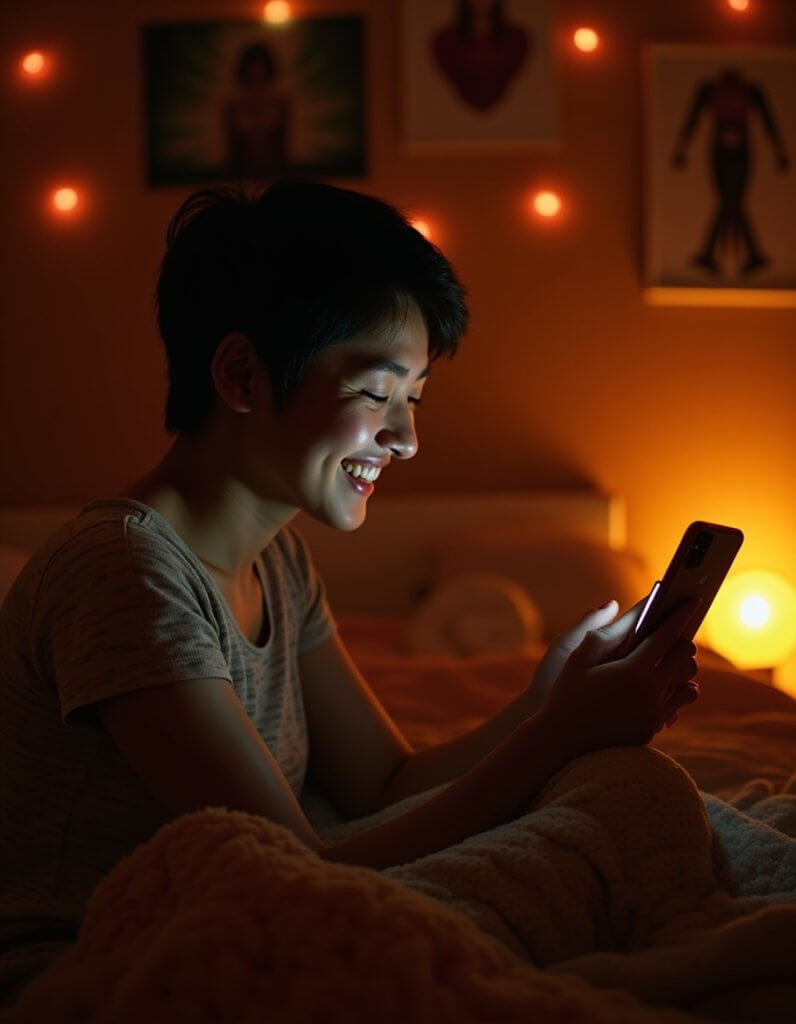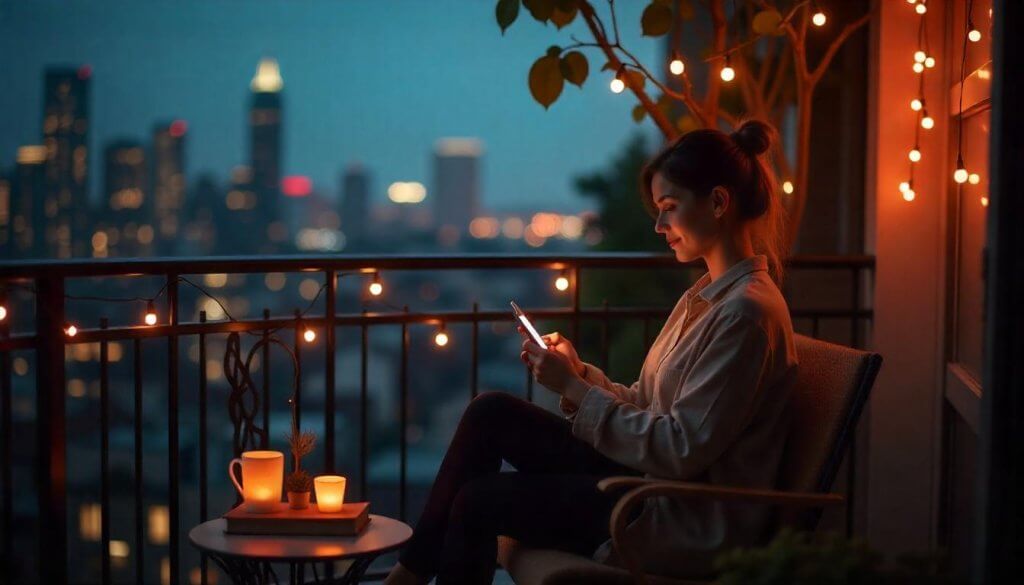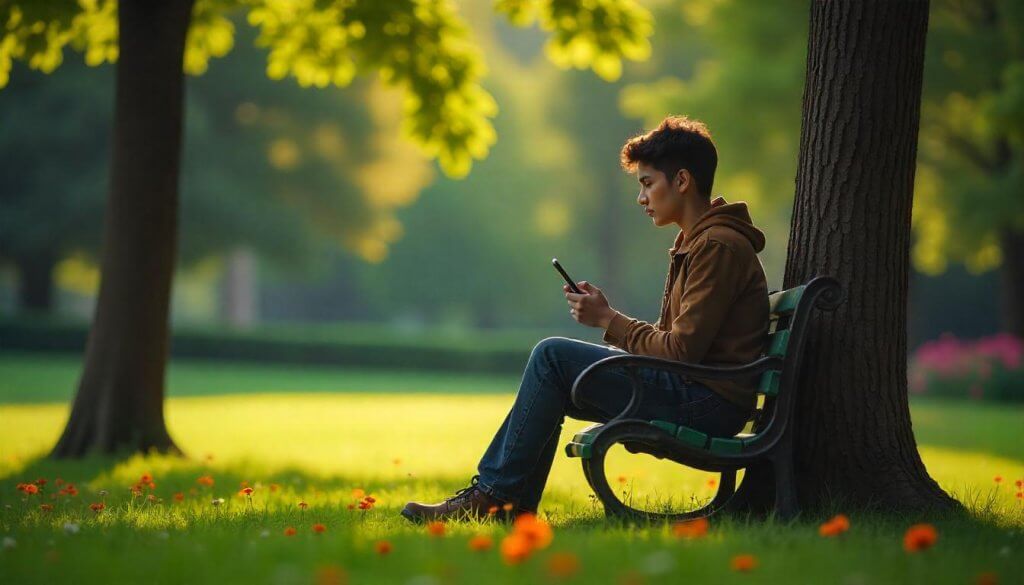Modern men are lonelier than ever. Between shifting gender roles, emotional burnout, and a dating culture that leaves many disillusioned, an entire generation is grappling with its sense of self and searching for meaning.
It’s 2:00 AM and the only light in my apartment comes from the street lamps sneaking through the blinds. I sit on the edge of my bed, bathed in stripes of shadow and light, feeling more alone than ever. In moments like this, the silence is deafening — a heavy reminder that modern male loneliness is real, pervasive, and often invisible. And I know I’m far from the only man living this reality.
In an age of constant connectivity, so many of us feel paradoxically disconnected. On paper, we have all the tools to reach out — smartphones, social networks, dating apps — yet night after night often ends with a creeping sense of emptiness. We scroll and swipe in search of a spark of connection, but often end up right where we started: alone with our thoughts. For years, society told men that we have it easy, that we should “man up,” be strong, and keep our problems to ourselves. But behind closed doors, a growing number of men are struggling quietly with feelings of isolation, exhaustion, and a loss of purpose. This isn’t just in our heads — something fundamental has shifted in what it means to be a man today, and many of us are left trying to understand our place in a world that seems to have moved on without us.
The Quiet Epidemic of Loneliness
For a lot of men, loneliness isn’t just about being single or not having plans on a Friday night — it’s a deeper sense of being unseen. Walk through any city street or scroll through social media, and you might notice an interesting phenomenon: countless men blending into the background, carrying their burdens silently. There’s a saying that circulates in hushed tones: men become invisible as they age. In our twenties, maybe we still felt noticed — by potential partners, by society expecting things from us. But as the years go on, if you haven’t hit the milestones society expects (the booming career, the marriage, the kids), you start to feel like a ghost in your own life. You’re there, but no one really sees you.
Many men throw themselves into work or personal projects to cope with this emptiness, only to find themselves burned out by thirty-five or forty, with little to show emotionally for all the effort. We hustle and grind, partly because that’s one arena where we’ve been taught we can prove our worth. Yet even at work, the recognition often never comes — or if it does, it feels hollow when there’s no one to share the success with at home. The result? A quiet, gnawing exhaustion. It’s not just physical fatigue; it’s emotional burnout from years of trying to live up to expectations without a solid support system. You come home to an empty apartment, sink into the couch, and wonder what all the effort was really for.
Loneliness can strike even when we’re with people. You might be out with a group of acquaintances at a bar, laughing and clinking glasses, yet feel utterly alone in the crowd. It’s the sense that no one truly knows you or even cares to know you beneath the surface banter. Modern masculinity often expects us to wear an armor of confidence and cool indifference — to be unbothered, self-reliant, and not show how much we might need others. But inside that armor, many of us are aching for real connection, for someone to genuinely ask if we’re okay (and to stick around for the honest answer). We yearn to be seen, flaws and all, yet fear that admitting this yearning just makes us less of a man. It’s a vicious bind: we’re lonely because we never show our true selves, and we never show our true selves because we’re told not to be lonely.
Shifting Roles and Lost Certainties
Why has it come to this? Part of the answer lies in how drastically the social landscape has changed in a single generation. Think about our grandfathers or even our fathers: for them, life often followed a straightforward script. Be a provider, get married, be the “man of the house.” If they checked those boxes, society deemed them successful men. The definition of manhood was narrow and traditional — and yes, often repressive in its own way — but it was clear. Today, that old script has been torn up. On one hand, that’s liberating: we aren’t confined to being only the stoic breadwinner or the distant father who never shows emotion. But on the other hand, many of us feel like actors dropped on a stage with no script at all. The roles we were prepared for have either disappeared or radically changed, and we’re improvising in real time, sometimes clumsily.
In the 2020s, women have rightly claimed more space in education, work, and leadership. They don’t need a man’s financial support or protection the way they might have in the past, and that’s a sign of progress toward equality. But as women’s roles have expanded, the traditional role of men hasn’t so much expanded in response as it has eroded. The old expectations — be strong, be a good provider, be in charge — no longer automatically apply, and new expectations are being written on the fly. We’re told to be more sensitive now, but not weak. To respect women and adapt to their strength, but somehow not lose our own in the process. To lead when necessary, yet also to defer and listen. It’s confusing terrain. We believe in equality; we want our partners, colleagues, and friends to thrive. Yet in private moments, many of us wonder: What’s my role now? Where am I needed, if at all?
The power dynamics in relationships and society at large have shifted, and with that shift comes a loss of automatic authority that men of past eras took for granted. And truth be told, that’s fine — respect shouldn’t come on a silver platter just because of your gender. But it’s an adjustment. Some of us grew up quietly assuming that if we worked hard and did “all the right things,” we’d earn a certain respect and status. Instead, we find that respect must be earned daily and even then can be elusive. In some spaces, we even feel under suspicion just for being male — as if any display of assertiveness might be perceived as toxic, any vulnerability as unmanly. We tread carefully, not wanting to be labeled the bad guy, yet this constant self-monitoring leaves us unsure of how to just be ourselves. We don’t want to be the domineering patriarchs our grandfathers might have been, but we haven’t been offered a clear alternative blueprint for healthy masculinity. So we hover in a strange limbo, unsure, and that uncertainty eats away at our self-worth.
Love, Sex, and the New Dating Hellscape
Dating was supposed to be easier with endless apps and opportunities in a big city. Instead, it often feels like I’m that lone figure under a distant streetlight in the fog, wandering an empty road in the dead of night. Each bright profile on my phone is like a pinprick of light in the darkness — enticing, hopeful, yet often out of reach. I’ve lost count of the number of first dates that never led to a second, the matches that turned into week-long text chats and then nothing, the brief flickers of connection that died out as quickly as they sparked. It’s exhausting. Instead of romance, what many of us find is a carousel of superficial encounters and rejections that leave us more guarded than before.
Modern dating culture has its perks — greater choice, the ability to meet people outside our immediate social circle, a sense of freedom to define relationships on our own terms. But there’s a dark side that guys don’t always talk about openly. Trust has become a rare commodity. I’ve seen so many of my friends endure cheating and betrayal, and I’ve had my own heart broken enough times that a part of me expects disappointment as the default. When you’ve been hurt or let down often enough, you start to approach new relationships with your guard way up. It’s like you go into every interaction braced for impact, half-expecting the other shoe to drop. Sure, she seems interested now, you think, but give it a month — she’ll get bored, or someone “better” will come along. These thoughts are toxic, but they’re hard to shake once they’ve taken root.
The dating apps and urban hookup culture haven’t helped. In theory, having countless options should make it easier to find someone special. In practice, it often turns people into options themselves — infinitely swipeable and replaceable. There’s always another match, another chat, another potential date, so why invest deeply in the one right in front of you? Everyone becomes a little disposable. We sense this, and it makes us feel disposable too. That takes a psychological toll. I’ve felt it in myself: after enough casual flings and fizzled chats, you start to wonder if you’re worth something meaningful to anyone. Or if you’re just a profile picture to be tossed aside when the next one pops up.
This environment breeds a kind of cynicism that’s hard to shake. Many men (and women, to be fair) go into dating with a defensive mindset: never let them see you care too much. We play it cool, we keep conversations shallow, or we juggle multiple prospects so we won’t feel crushed when one doesn’t work out. It’s emotionally taxing to live this way. The irony is that we crave connection deeply, yet we participate in a culture that constantly undermines it. In a city of millions, you can go on dates every week and still never feel like you truly know anyone — or that they know you. Over time, that leads to a profound sense of disillusionment. Some guys just give up on dating entirely for long stretches, because the whole process feels like running on a treadmill: you expend all this effort and end up nowhere, maybe even a few steps back in terms of hope and trust.
Our parents’ generation often met through friends or family or community events — there was a built-in accountability and a level of organic trust. If my dad messed around, word would get back to my grandma or his boss or someone who cared, so maybe he thought twice. Now, you meet someone who exists in zero of your social circles. If things go wrong, you can vanish from each other’s lives with a swipe and never face any real consequences. Ghosting someone is so easy it’s practically expected. And while it’s convenient, it contributes to this ambient distrust. We’re all a little paranoid, a little jaded, because we’ve seen how easily people can drop one another. The result is that genuine intimacy — the kind where you slowly learn someone’s soul and let them learn yours — feels harder to achieve than ever, even as hookups or surface-level relationships abound. It’s a paradox that leaves many of us feeling cheated and empty.
The Rise of the Insta-Therapist
Amid all this chaos, it’s no wonder men are looking for guidance. And indeed, everywhere you turn there’s advice — so much advice. The past decade has seen an explosion of what I think of as performative psychology and pop-therapy culture. Scroll through Instagram or TikTok and you’ll see countless bite-sized doses of wisdom: motivational quotes about self-love, slick infographics about mental health, “alpha male” coaches hawking confidence tips, or self-proclaimed relationship gurus giving you their hot takes on why you’re still single. In theory, it’s great that we’re talking more about mental well-being and emotions. The stigma around men seeking help has started to crack. But along with that has come a wave of pseudo-therapists and quick-fix self-help peddlers, and navigating their noise can be maddening.
Not all advice-givers are created equal. Some are licensed professionals sharing valuable insights, but many are just people with charisma and an angle, capitalizing on our hunger for answers. They’ll promise to heal your trauma or “unlock your masculine potential” if you buy their online course or follow their ten-step program. I’ve clicked those links at low points — I’m not proud of it, but I was desperate — and it’s usually the same recycled platitudes. Think positive. Hit the gym. Grind harder. No, wait, grind less and meditate. It can feel like being on a seesaw: one moment you’re told to embrace vulnerability, the next moment to stop being weak and assert yourself. The mixed messages are endless, and they often leave us more confused than when we started.
Even our well-meaning friends and family can become armchair psychologists, tossing around terms they read online. Suddenly everyone’s talking about attachment styles or diagnosing their ex as a narcissist or their dad as having “toxic masculinity.” These concepts have merit in the right context, but in the pop-psychology echo chamber, they often get oversimplified and thrown around as buzzwords. If a man dares to express that he’s feeling lost or depressed, he might get a shallow piece of advice in return: “Have you tried therapy?” or “You need to love yourself first, bro.” It’s not that these suggestions are wrong — therapy is important, self-love is crucial — but the way they’re delivered can feel dismissive, as if ticking a box: Problem mentioned, generic solution given, case closed.
The truth is, there are no quick fixes for what we’re going through. You can’t cure deep loneliness or an identity crisis with a motivational tweet or a podcast episode. Real psychological growth is slow, often painful, and highly personal. It requires actual work — sometimes with a professional, sometimes through introspection, often both. But the culture around us makes it seem like if we just read the right book or follow the right influencer, we’ll unlock the secret to happiness. When those promises inevitably fall flat, it’s easy to feel even more disheartened. Everyone else seems to be fixing their lives, why am I still struggling? we wonder. The reality, of course, is that everyone is struggling, but on social media they’re performing wellness and success, just as we often perform being “okay” in our daily lives. It’s all performance, and it can create a warped mirror that leaves us feeling defective when we can’t solve our problems as neatly as an Instagram reel would suggest.
As men, we find ourselves caught between a genuine desire to get better — to be happier, more connected, more fulfilled — and a deep skepticism of all the slick self-help messaging. We want to open up, but we don’t want to be patronized or sold snake oil. We want to heal, but we’re not sure where to turn when so much of what’s out there feels like a hustle or an echo chamber. It’s frustrating, but I try to remind myself (and any brothers reading this) that it’s okay to tune out the noise. You don’t have to chant mantras or buy a guru’s course to start working on yourself. Sometimes it begins with something as simple as an honest conversation with a friend, or writing down what you’re feeling, or yes, seeking a real therapist who feels like a good fit. The performative psychology circus may be loud, but our personal growth doesn’t have to be a public performance. It can be quiet, real, and done on our own terms.
Alone, By Choice or By Chance?
With all these pressures and disappointments, it’s no surprise that many men are retreating into solitude. In fact, being alone has started to seem like a reasonable choice, even a desirable one, given the alternatives. Society has slowly begun to normalize the image of the solitary man. No longer is a lifelong bachelor automatically pitied; sometimes he’s even envied. “Doing your own thing” sounds empowering. And truly, there is power in solitude. Many of us have learned to enjoy our own company. We pursue hobbies, careers, or personal projects with passion. We appreciate the calm and freedom that comes with answering to no one. After all the drama and dashed expectations, being alone can feel like a safe harbor.
But here’s the catch: there’s a fine line between solitude as a healthy choice and solitude as a shield against pain. A lot of men (and I include myself here) have at times chosen to be alone not because we’ve discovered some enlightened form of independence, but because we’re exhausted. Because trying and hoping and hurting became too much, so we told ourselves it’s better this way. We say, “I like my freedom; I don’t want to settle,” and maybe part of us means it. Yet, late at night, in that quiet apartment, when we’re honest, we know that loneliness has become our unwelcome companion. We tolerate it, we even embrace it in public, because at least it’s familiar and it can’t hurt us the way people can.
It’s startling how quickly “normal” this lifestyle can become. You get used to making dinner for one, coming home to silence, planning your life entirely around yourself. Again — that can be okay! It can even be great for a while. Not every man needs a wife or kids or a bustling social life to be content. But for many of us, this normalization of solitude is a double-edged sword. The more we normalize it, the less inclined we are to break out of it. The walls around us grow higher. We convince ourselves people are unreliable, or that we’re just “not relationship material,” or that no one would want us anyway, so why bother? It’s a defense mechanism that calcifies into a lifestyle.
I’ve found that the first step out of this mental trap is a brutally simple one: admitting what we really feel. For me, writing these words is part of that admission. The truth is I don’t want to be alone forever. I don’t think most men truly do. We want real friendships, love, families, communities — all the things that give life color and meaning. Admitting that need, that vulnerability, is hard. It goes against all the programming. But it’s also liberating to just say it: I feel lonely sometimes. I feel left behind. I want more. These statements don’t make us less masculine; they make us human. And they open the door, even if just a crack, for change.
There’s no neat conclusion to an issue this complex, but there is a glimmer of hope. I see more men starting to talk about these feelings, whether in anonymous online forums or in quiet heart-to-hearts with a buddy. That matters. The more we drag these anxieties into the light, the less power they have over us. Modern male loneliness thrives in secrecy and shame, so talking about it is a rebellion of sorts — a way to break the silence that isolates us.
Where do we go from here? Perhaps the path forward for men in the 2020s is to forge a new identity from the ground up. One not defined solely by what we provide or how impervious we are to pain. We can learn to find self-worth beyond paychecks or romantic conquests. We can be mentors to each other, support each other’s passions, and allow ourselves emotional richness without shame. It might mean redefining friendship — making it okay to call up a pal and talk about things deeper than sports or work. It might mean letting go of outdated pride and finally calling that therapist, not because someone on Instagram told us to, but because we owe ourselves the care.
For my part, I’m trying to remember that being alone now doesn’t have to mean alone forever. I hold onto the hope that by being honest — by writing an article like this, by starting these conversations — I’m chipping away at the stigma. Maybe some other guy reading this will recognize a piece of himself in these words and feel a little less isolated. Maybe he’ll put down his phone after reading and decide to text a friend to grab a beer or a coffee and actually talk. Maybe I’ll do the same.
The world around us is noisy and fast and often indifferent, but that doesn’t mean we have to be. We can choose, little by little, to reach out, to listen, to build trust again. We can choose to believe that our value isn’t gone just because the old markers of manhood have changed. In the end, the story of the modern man isn’t just one of loneliness; it’s one of resilience and rebirth. We’re writing new definitions for ourselves — sometimes painfully, often clumsily, but honestly. And as we do, we might just discover that we were never truly as alone as we thought.














Muy bueno, pero prefiero estar solo.
Fantástico, pero te falto lo mas importante: El daño del feminismo de la 3ra y 4ta ola y el tema de la repartición de bienes y patria potestad siempre a favor de las mujeres como factor determinante para decidir transitar el camino de la “soledad”.
Захотелось, позвать друга, выпить с ним пива и поговорить о моём одиночестве! Но, у меня нет друга). Спасибо за пост, очень в тему, я задумалась!
non si CUCCA più è quello il problema ….